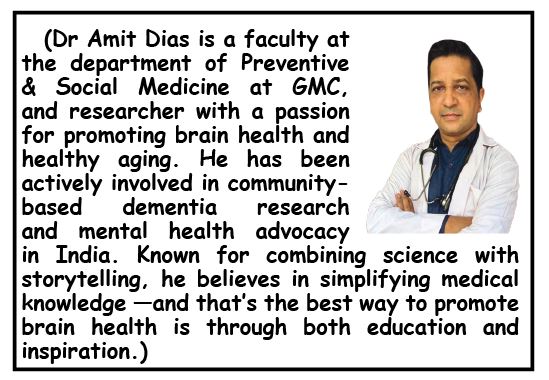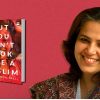Goa is abuzz with excitement as vintage bike and car owners, users, collectors and fans are decking […]
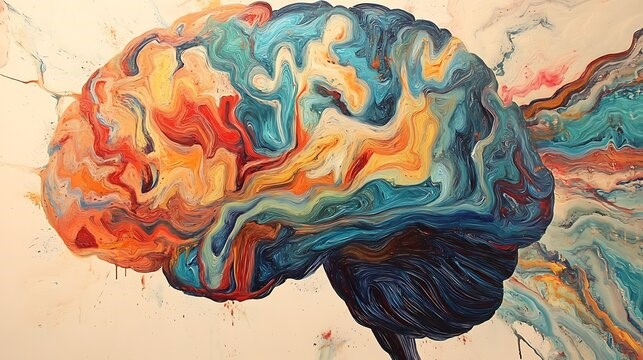
MIND THE MIND A World Brain Day Special!By Dr Amit Dias, MD
July 12- July 18, 2025, MIND & BODY, HEART & SOUL July 11, 2025World Brain Day is observed on July 22. To mark this occasion we have a thought-provoking article reflecting on the importance of investing in brain health. After all, when we care for our brain, it rewards us in countless ways: with clarity of thought, emotional resilience, creativity, and independence. “Keep your brain brainy, bright and brilliant,” says Dr Amit Dias as he shares steps for brain health here….
WE often hear the phrase “mind over matter”—but what happens when the mind itself becomes the matter of concern?
Brain health is more than just the absence of neurological disease. It’s about keeping our minds sharp, resilient, and active—throughout life. It influences how we think, learn, remember, move and manage stress. A healthy brain empowers independence, enriches relationships, and supports well-being at every stage of life—from childhood development to healthy aging.
The World Health Organization (WHO) defines brain health as “the state of brain functioning across cognitive, sensory, emotional, and motor domains, enabling individuals to achieve their full potential throughout life, regardless of the presence or absence of disorders.”
Optimizing brain health means more than treating disease—it means actively addressing physical, social, and environmental factors to build a society where everyone can thrive. In doing so, we not only improve individual health outcomes but also contribute to broader societal and economic growth.
This Brain Health Day on July 22, let us explore why brain matter matters, how the brain functions, what threatens it, and how we can protect it—using both hemispheres of our own brain in the process.
Brain Anatomy
WE are talking about a 1.4 kg marvel tucked inside our skulls that governs our lives, defines our identities, crafts our memories, and gives meaning to the world around us. On this Brain Health Day, let’s pause and thank the master conductor of our lives.
Made up of approximately 86 billion neurons, it has the consistency of soft tofu and the complexity of the cosmos. It’s about 2% of our body weight but consumes over 20% of our oxygen and calories.
Let’s dissect the brain to understand it:
The major parts of the brain:
Cerebrum: The largest, most evolved part—divided into two hemispheres (left and right). It controls higher brain functions like reasoning, emotions, language, and voluntary movement.
Cerebellum: The little brain at the back. Balance, coordination, and fine motor skills.
Brainstem: Controls automatic functions like breathing, heart rate, and sleep cycles. The reptilian bit of our brain.
Limbic System (includes hippocampus and amygdala): The seat of emotions, memory, and the occasional irrational crush.
Left vs Right Brain
We must nurture both. A symphony needs all instruments, and your life needs both reason and rhythm.
The left hemisphere is logical, analytical, mathematical. It loves spreadsheets, legal arguments, and facts.
The right hemisphere is creative, intuitive, and artsy—it appreciates poetry, painting, and puns.
Common Brain Disorders
Brain health issues are diverse and devastating.
Stroke – The leading cause of disability worldwide.
Traumatic Brain Injury (TBI) – Road traffic accidents, sports injuries.
Dementias – Alzheimer’s being the most common, and rising steadily with population aging.
Mental Health Disorders – Depression, anxiety, schizophrenia.
Neurodevelopmental Disorders – Autism, ADHD.
Brain Infections – Encephalitis, meningitis.
Neurodegenerative Diseases – Parkinson’s, ALS, Huntington’s.
With rising life expectancy, the burden of neurological and mental health conditions is increasing. The Lancet Commission on Dementia in 2020 estimated that up to 45% of dementia cases could be prevented by addressing modifiable risk factors. So yes, brain health is public health.
Why the Brain Matters?
World Brain Day is a reminder to all of us that we should not take this valuable asset for granted. Our brain health deserves our attention? Because everything else follows. While a failing heart may be supported or even replaced, a failing brain steals the essence of who you are—your memories, your personality, your ability to think, feel, and connect.
In an age where artificial intelligence is advancing at lightning speed, we must not neglect our natural intelligence. Brain health is the foundation of our productivity, creativity, empathy, relationships, and decision-making. It affects how we live, love, and lead.
You can’t pour from an empty cup—and you certainly can’t make wise choices or care for others with a neglected mind. Investing in your brain is investing in everything else.
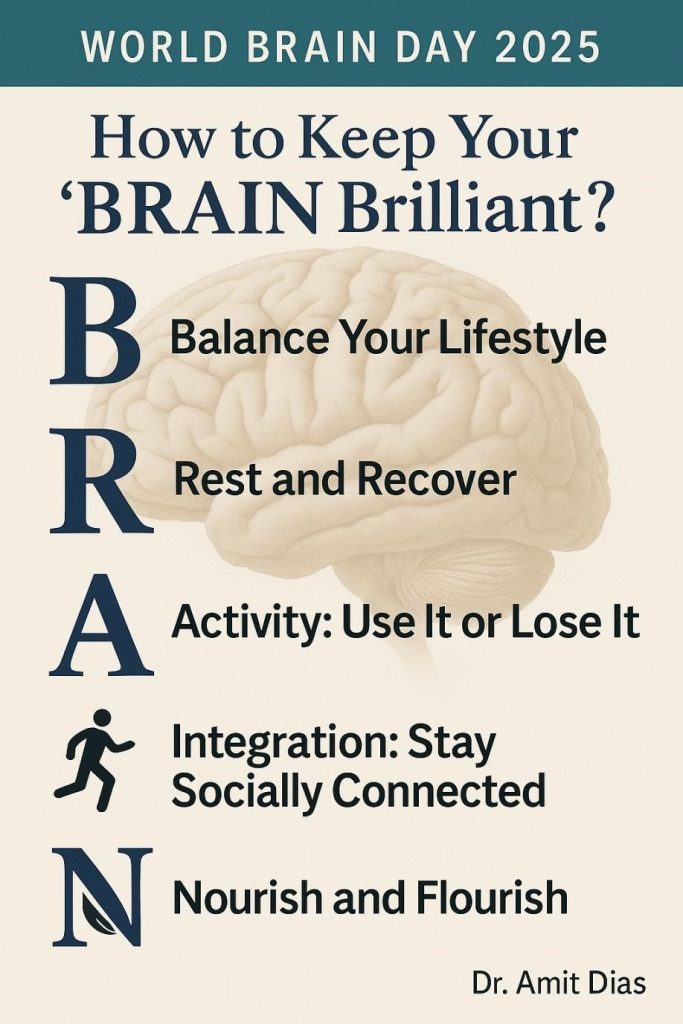
How to Keep Your BRAIN Brilliant:
Here is my simple formula to keep the brain brainy, bright and brilliant.
B – Balance Your Lifestyle
Balanced diet: Mediterranean-style. Rich in fruits, vegetables, nuts, fish, olive oil, and dark chocolate (yes!).
Balance you work with physical activity and exercise: At least 150 minutes per week of moderate aerobic exercise is recommended.
Blood pressure, blood sugar, and cholesterol under control.
Healthy body, healthy brain. The two are not separate entities.
R – Rest and Recover
7–9 hours of good quality sleep each night is essential for memory consolidation, organizing and toxin clearance
Avoid screen time before bed; reduce caffeine after 2 pm.
Learn to cope with stress: mindfulness, prayer, music, or even gardening.
Remember: Every problem has a solution. If not, it’s not your problem.
A – Activity: Use It or Lose It
Physical activity increases blood flow to the brain and stimulates neuroplasticity. Neuroplasticity means your brain can rewire itself—use it or lose it is literal.
Cognitive activity: Read, write, solve puzzles, learn a language or musical instrument. Even doodling helps!
Avoid passive scrolling—reels are not a brain vitamin.
I – Integration: Stay Socially Connected
Socializing stimulates brain areas involved in emotion regulation and memory.
Join clubs, attend workshops, church & temple groups, talk to neighbors.
If your friend circle has scattered… make new ones.
N – Nourish and Flourish
Avoid harmful substances: No smoking, no excess alcohol, no recreational drugs.
Protect your brain physically: helmets, seat belts, and fall prevention in the elderly.
Keep learning, keep growing. Flourishing is more than surviving
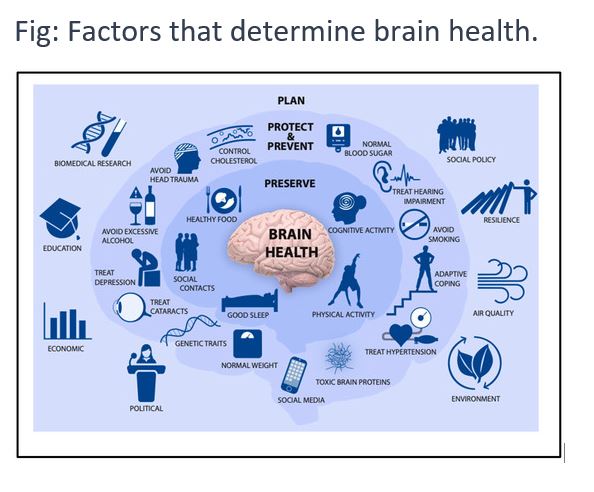
Stroke: A Time-Sensitive Emergency – BE FAST!
Time is brain. The longer you take to reach to a hospital that can provide advanced care, the more brain cells you will prevent from distraction. Stroke is a brain attack. Act fast to save brain tissue if you notice these signs.
B – Balance: Sudden loss of balance or coordination
E – Eyes: Sudden vision changes in one or both eyes
F – Face: Facial droop on one side
A – Arms: Arm weakness or drift
S – Speech: Slurred or strange speech
T – Time: Call emergency services immediately (No.108 is for an ambulance)!
Time is brain. Every minute, 1.9 million neurons die in an untreated stroke.
Preventing Alzheimer’s and Other Dementias
According to the Lancet Commission (2020), 14 modifiable risk factors can reduce dementia risk by up to 45%:
Hypertension, Hearing loss, Smoking, Obesity, Depression, Physical inactivity, Diabetes, Low social contact, High LDL cholesterol, Visual impairment, Low education, Traumatic brain injury, Alcohol misuse, and Air pollution.
These are all actionable. Prevention must begin in early life and continue throughout life. It’s never too early, and never too late.
Final Thoughts:
Let’s not wait for the brain to fall sick before we start appreciating its role.
Treat your brain like royalty: feed it, rest it, exercise it, stimulate it, and surround it with good company…..Because when the king is well, the kingdom thrives.
